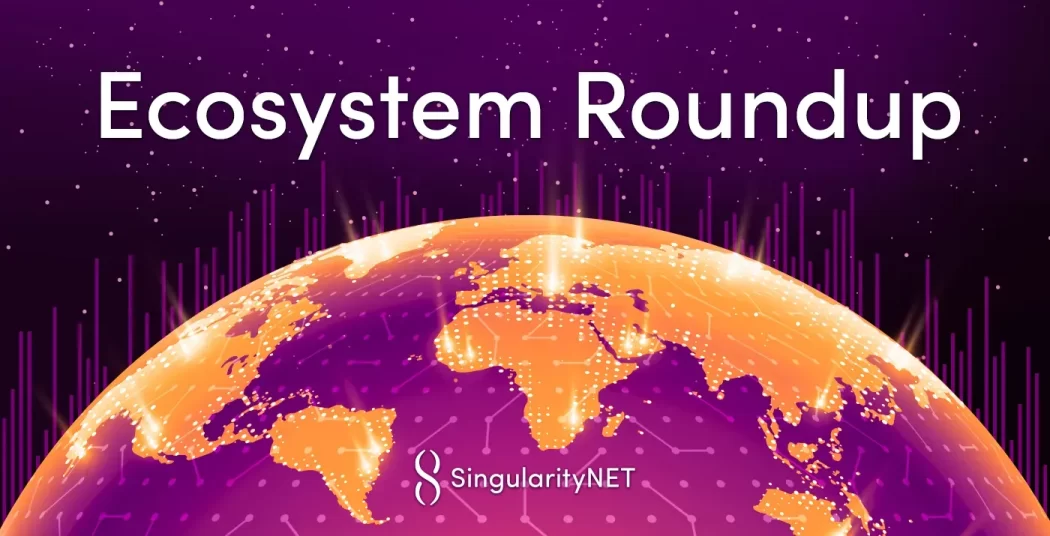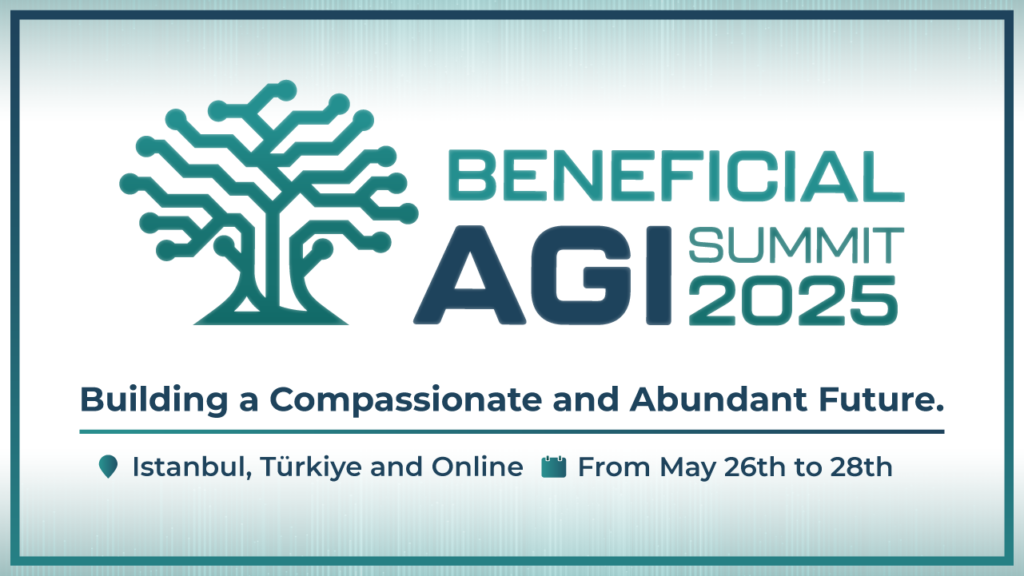
Welcome to the January 2025 edition of our Ecosystem Roundup. This month’s update covers key decentralized AI Platform developments, research and development initiatives, progress reports from Strategic Initiatives and Community Ambassadors, highlights from ecosystem projects, recent event participation, and notable media coverage.

Building on the success of our inaugural event, which gathered over 1,100 participants (in-person and online) from 22 countries, the Beneficial General Intelligence Summit & Unconference 2025 (BGI-25) will convene a worldwide community of industry leaders, entrepreneurs, investors, media, academics, and the global leading voices in AI and AGI.
The BGI-25 programming will kick off in Istanbul, Türkiye, with an opening keynote by Dr. Ben Goertzel, CEO of SingularityNET and the Artificial Superintelligence (ASI) Alliance. Over the course of three days, the most influential and established opinion leaders in the AI and technology space will come together to establish valuable connections and work together to address the critical challenges of developing beneficial AGI, while exploring how we can shape a future where advanced AI systems serve the collective interests of humanity and all sentient beings.
This year’s interactive agenda will include mainstage keynotes and panel discussions, technology workshops, one-on-one meetings, networking opportunities, and immersive experiences—both in-person and online. The focus will be on discussing issues, making conceptual progress, forming collaborations, and engaging in practical actions to catalyze the emergence of beneficial AGI based on the ideas and connections set in motion by all involved.
Online registration is now open, while in-person registration will commence in February 2025.
We introduced ActPC-Geom, an approach to accelerate Active Predictive Coding (ActPC) in neural networks by integrating information geometry, specifically using Wasserstein-metric-based methods for measure-dependent gradient flows.
ActPC comprises a biologically inspired framework for learning and inference. By minimizing prediction errors between internal models and observed data, ActPC iteratively refines both latent representations and model parameters. Unlike backpropagation-based neural networks, ActPC emphasizes local error signals, making it inherently more suited for real-time, online learning and integrating reinforcement learning and symbolic reasoning.
Traditional gradient-based optimization in neural networks struggles to support large-scale real-time learning dynamics due to the brittleness of the underlying backpropagation algorithm, which requires carefully coordinated and synchronized updating across a large network. This leads to a reliance on large batch-based updates and suffers convergence problems when neural architectures are too recurrent or complex. These shortcomings lead to the insufficient pursuit of neural architectures oriented toward robust AGI-oriented learning, reasoning, and memory.
While ActPC resolves these issues on a conceptual and mathematical level, it can suffer lengthy convergence times and undesirable transient dynamics. Information geometrically enhanced ActPC (ActPC-Geom) provides a compelling potential alternative. By incorporating measure-dependent operators derived from the Wasserstein distance, ActPC-Geom aligns parameter updates with the natural structure of the probability distributions underlying ActPC, thus accelerating learning and smoothing out digressive transient dynamics.
Like most practical applications of information geometry, ActPC-Geom faces significant computational challenges. However, these can be addressed by appropriately deploying machine learning and reasoning algorithms within the geometric modeling itself. This can be done using neural approximators and information-geometry-guided kernel-PCA-based embeddings. Further, these ML and MR algorithms can be used to inject valuable cognitive properties into the neural learning process, alongside providing acceleration.
This novel architecture has the potential to achieve sophisticated deliberative thinking dynamics, e.g. blending few-shot learning in activation space with incremental weight updates, and incorporating flexible associative long-term memory. It should also be extremely amenable as the subsymbolic half of hybrid neural-symbolic architectures, due to the generality of the principles of predictive coding and information geometry.
This month, our Decentralized AI Platform team made significant progress in enhancing core functionalities. Daemon version 5.1.6 was released, adding HTTPS support to the IPFS URL, custom errors linked to the Developer Portal, and improved logging, along with several bug fixes. The Command Line Interface reached version 2.4.0, featuring encryption for private keys and mnemonic phrases. Substantial work was completed on Training Version 2, including the introduction of pending and public model storage, dynamic status updates for models, model creator verification, standardized training-related error handling, and new gRPC interceptors for paid methods. Filecoin support was incorporated into the Publisher Portal, JavaScript SDK, and Python SDK to improve integration and Platform usability. The JavaScript and Python SDKs also integrated Training v2 functionality.
Further platform improvements include a new feedback form and authentication system in the UI Sandbox, enabling unified access to services like the Marketplace and Publisher. The Marketplace saw enhancements to access rights and the beginning of Filecoin integration. The Developer Portal updated documentation, including for the UI Sandbox, and created new user guides, such as one for Training v1 usage via the Marketplace. A video guide showcasing the UI Sandbox user flow is also in development.
Our Strategic Initiatives Office continued to advance SingularityNET’s position in the decentralized AI space, with a focused approach to commercialization, revenue modeling, and resource orchestration. Strategic exploration concentrates on emerging technological domains, including decentralized AI infrastructure, cross-chain interoperability, and advanced computational resource optimization.
As of January 31, 2025, we have established 40 active partnerships. These collaborations span key areas such as AGI-Ops (14 partnerships), new revenue streams (15 partnerships), and new ventures (11 partnerships). These partnerships are already demonstrating success in delivering viable products, generating recurring revenue, enabling successful ecosystem development, and creating value for our community.
Our community-driven Ambassador Program continues to strengthen the transparency and decentralization of our ecosystem. Key activities and achievements for January include:
To learn more about these recent developments, explore the Program’s Archives or watch the recordings of the weekly Town Hall meetings on YouTube.
If you are interested in getting involved and joining our community-driven guilds and workgroups, please join our Discord server and navigate to the How to Join section for guidance.
Rejuve.AI is a decentralized, AI-driven longevity research network allowing people worldwide to track their health data, receive valuable insights, contribute to cutting-edge longevity research, and earn RJV rewards.
Decentralizing the audio for real-time industries. Building the world’s first audio-specific DePIN, enabling super-fast and easily scalable audio connection for communication with AI agents and real-time industries such as music, entertainment, or gaming.
We maintain a strong presence at major industry events worldwide, advancing discussions around decentralized AI, beneficial AGI development, and the future of superintelligent systems.
This section highlights some of January’s events where we shared our vision for democratic and accessible AI development while fostering valuable partnerships within the broader Web3 and technology ecosystems.
At Alibaba Cloud’s Web3 Cloud Day 2025 in Singapore, a panel on “West Meets East: Regional Landscape & Global Expansion” explored global Web3 development challenges and opportunities.
Moderated by our COO and Artificial Superintelligence Alliance Board Director, Janet Adams, the panel united industry leaders who are advancing different aspects of Web3 development: Igor Arkhypenko (CTO, Dubai Blockchain Center), who is leading the development of blockchain solutions for both commercial and government projects; Wali Khan (CCO and Co-Founder, Aylab.io), who is developing analytics and visibility tools to democratize Web3 access; and Michael Heinrich (CEO and Co-Founder, 0G Labs), who is building the first decentralized AI operating system and providing infrastructure to scale and future-proof Web3 AI.
The discussion examined regional nuances in Web3 adoption, focusing on Dubai’s implementation of its comprehensive blockchain strategy. Arkhypenko detailed how the three-pillar approach—government efficiency, industry creation, and international leadership—has established frameworks for public-private collaboration while providing educational programs for UAE authorities and commercial organizations. This contrasted with the Asian markets’ evolution, where rapid mobile technology adoption and gaming ecosystem integration have accelerated decentralized application development and user engagement.
Regulatory considerations formed a substantial portion of the dialogue, particularly examining the implementation of Markets in Crypto Assets (MiCA) regulation in Europe by December 2025. The panel analyzed how these frameworks affect crypto exchanges, offerings, and frontier AI model deployment across jurisdictions. The discussion highlighted the contrasts between European regulatory approaches and Eastern market frameworks, examining implications for cross-border operations and technology implementation.
The panel addressed specific challenges in global expansion, including regulatory uncertainty manifesting in de-banking and retroactive enforcement issues, cultural barriers affecting technology accessibility and user behavior, and uneven technological infrastructure development, particularly in on-off ramp architecture. Specifically, Heinrich examined requirements for adapting AI blockchain architecture to scale Web3 and AI infrastructure across diverse regional environments.
Practical strategies for global expansion emerged as a key theme, with panelists examining how Eastern markets’ strengths in rapid adoption and developer ecosystem growth complement Western regions’ advancement in foundational research and protocol development. The discussion stressed opportunities for enhanced cross-regional collaboration, particularly in standardizing approaches to technological implementation while maintaining sensitivity to local regulatory requirements and cultural considerations.
The dialogue concluded by exploring how emerging technologies, particularly in decentralized AI and blockchain integration, could foster more ethical and inclusive system development across regions. This included examining data infrastructure requirements, regulatory compliance frameworks, and strategies for building trust in new markets through local partnerships and community engagement. A notable example Janet discussed was the DigiTruck Ethiopia program. This initiative demonstrates effective community engagement through its mobile digital lab providing programming and robotics training to underprivileged youth aged 8-18 in marginalized areas, showcasing how technology initiatives can drive inclusive development while addressing infrastructure challenges.
Recent media coverage highlights the progress we are making, the partnerships we are forging, and the thought leadership we are providing in the AI space:
We are proud of the work our teams and community accomplished in January. We remain committed to advancing decentralized, beneficial AGI for all by creating space and opportunity for everyone to access, benefit from, and contribute to developing frontier technologies.